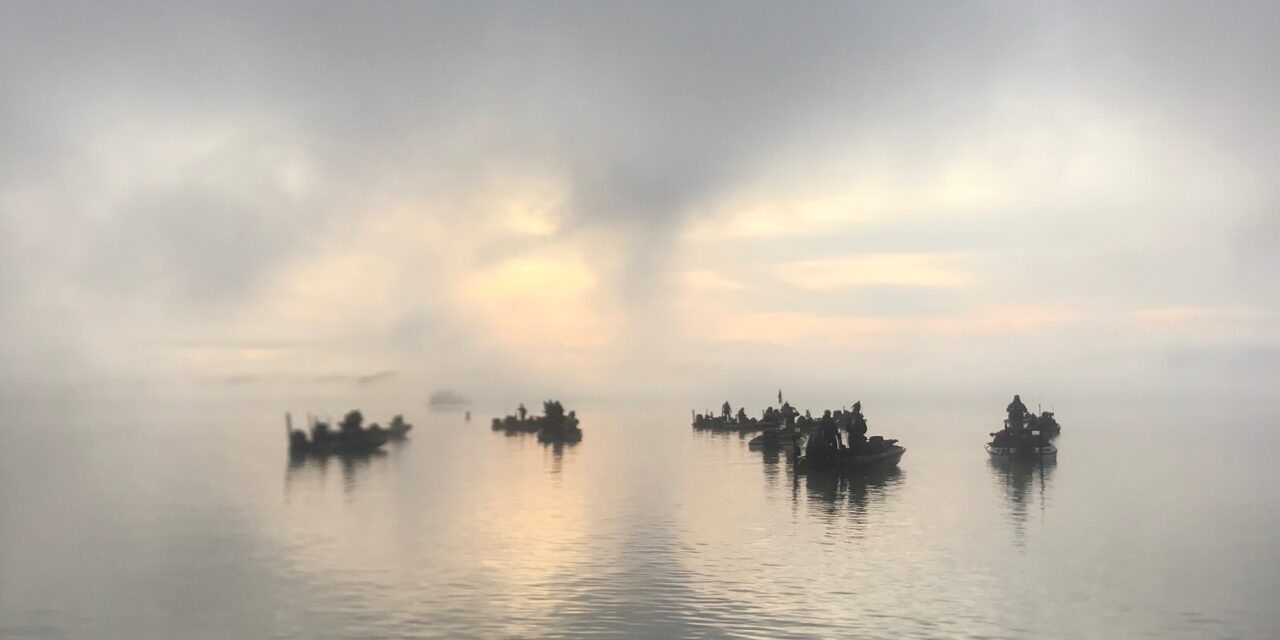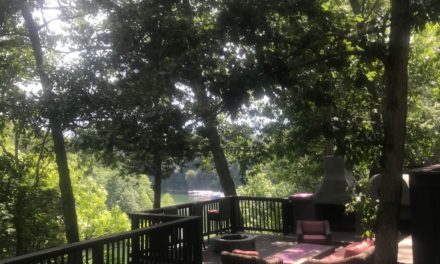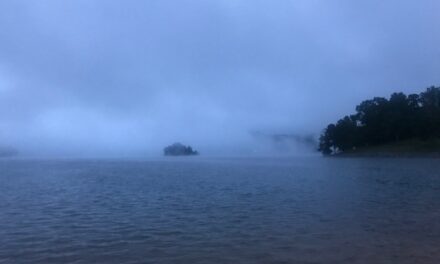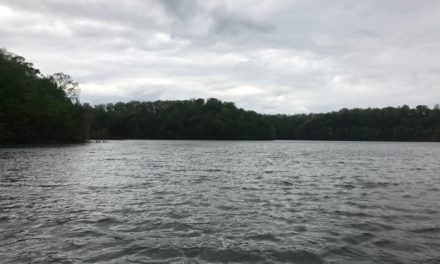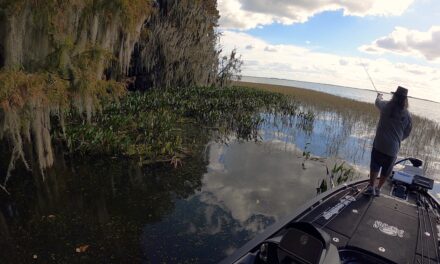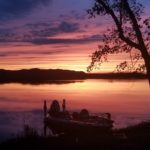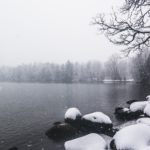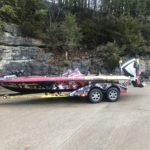And then, the heat receded…the long blue skies darkened, cold rain fell, the nights took on a chill, and summer ended.
It was a marathon of epic proportions. Any other year, I would have spent July and August in upstate New York, Cayuga, Champlain and St Lawrence river, with a stop at Great Pond in Maine, and then the trek across Canada into Michigan, and onto Wisconsin for an extended fish in Pools 7,8, and 9, thereby dodging the heat and taking advantage of highly active times in the northern fisheries.
But this year was unique. This year I learned that for every tough northerner, long hardened to the winter cold, big water, and cruel wind, there is an equally tough southerner hardened by the unrelenting heat and stubborn bass, where nothing seems to stir for hours as the glare makes the world seem as though time has stopped, and become unreal. While both are trials of the body, they are harder on the mind.
Now it’s no secret I have great admiration for Kentucky and Tennessee. I say Kentucky and Tennessee because I chose Lake Cumberland in order to be squarely on the border, and in a sense belonging to both. And while I will forever be a northerner, shaped by Maine, Michigan, and Minnesota; my son is not…such is my regard for my new home and neighbors, who with my wife and I are shaping his experiences and perception. And to be clear, it isn’t just about fishing, it is about the culture of this place, and what you can learn from a group of people so different than those with whom you are familiar. I marvel at the regular demonstration of dedication to one’s home, family, faith, and personal conviction, all wrapped in a sense of patriotism, manners, and general goodwill. There is a term down here I have heard many times when describing an individual in conversation. It is ‘good people.’ Typically related as ‘he or she is good people.’ I am fortunate to find myself surrounded by good people. I fish with good people. My neighbors and friends are good people, who could ask for more.
Yet this really was a bonus that I had never anticipated. My reasons for coming here were grounded in fishing. I moved here because I realized years ago that if your goal is to be a complete angler, you have to make the pilgrimage to the middle states and internalize the lessons these great fisheries, and great fisherman have to offer. There are lessons here that cannot be learned anywhere else.
This summer was the grueling aspect of that education.
I had never actually fished through a summer in the southern states. And to be clear, there is a difference between fishing during the summer and fishing through a summer. The first is taking on the local elements for a day, or days, the second was a 90 day trial. Every evening you left summer on the water, only to find it again the morning after. Unchanged and equally unwilling to release the hold on you. What stands out in my mind are moments that were simply full of wonder. The experience of fishing offshore in the glare for hours and then a single cloud would provide shade and the world was perfect, if only for a few minutes. Or the stifling heat making it hard to move (not that you need to move dragging a tube through 88 degree water) and then a wisp of wind provides a feeling of such relief that you cant help but smile. There are so many good moments, but they were based on summer taking its foot off my neck for a few seconds, and this is just the physical.
The mental was far far worse.
The mental struggle began when everyone shifted to fishing at night, except me. As I have mentioned, I don’t fish at night, ever. I don’t even tend to fish in the evening, but rather keep regular sunrise to about 5 pm hours. As June progressed and Independence Day approached, I noticed fewer and fewer boats on the water during the day, and this roughly coincided with the adventure of fishing amidst pleasure craft.
Summer fishing in reservoirs is at times about main lake deep structure. This isn’t to say that there are not opportunities in the creeks and pockets, but these strategies can be sporadic in terms of effectiveness. In any case, I was spending a lot of time out on the main lake, which lacks shade, as I have gone into, but does not lack wake boats and the hated cigar boats.
I absolutely hate cigar boats. But we can get into that later.
In addition to this issue, the fish, pressured by night, and harassed by boat traffic all day, seem to get into a more stubborn than usual state. Now let’s clarify something that I hear people say that I think it completely untrue. I have heard people say that the bite shuts off in reservoirs during the day in the summer because the fish are heat stressed. But the depth of the reservoirs suggest that this is not really the case. Now notwithstanding issues in lakes with a shallow thermocline, the fish have the option to essentially choose their water temperature based on depth. It may be 88 degrees or more on the surface in august, but that temperature plunges significantly at 35 feet, especially if the lake has some color in the water thereby preventing penetration of light. So heat, while significant is not really the reason the bite gets tough. The difficulty, in my mind, comes from three factors.
The size of reservoirs make fish location, and more particularly, identification very difficult. One of the real issues I had coming from up north was reconciling the size of reservoirs against what I perceived to be a featureless profile. This was years ago and I no longer feel this way, but I remember being literally assaulted by a sense of fruitlessness when it came to trying to logically ascertain a mechanism to locate fish. Consider the greatest hits of fish location aside from shoreline features. Current, underwater structure, roadbeds, channel swings, point variation, the list goes on. The average reservoir lake has 20+ miles of main channel, hundreds of structure formations, dozens of roadbeds, more channel swings than you can count, points of every shape and size, and this is before you include sunken houseboats, telephone poles, the occasional church steeple from before the flood, unmarked troughs and ditches, to say nothing of the pile of Christmas trees your father and grandfather have been secretly dropping in the same cove since 1960. Add in variation of water level, the dam generating power, and the natural unpredictability of the unruly bass and you have a problem in terms of location.
But this is assuredly trumped by the masses of fish you do locate, and try to catch only to come up with nothing. The question begins to go through your mind as to whether you are doing something wrong, or maybe the bite is off, or maybe these are not bass at all.
The answer is yes…and no. Trying to catch a finicky fish is not about right or wrong, its about right or wrong today. Let me give you an example. Last time I was up at St. Lawrence river I was throwing a Strike King ned Ocho on a drop-shot. Simple set up, 7′ Team Lews Custom Pro Series rod in medium power, with 8 lb floro on a Lews Custom Speed Spin Series rod. I was far East of Waddington on this 1/2 mile wide shoal that has a little 10 foot channel that runs about 30 feet into the shoal until it dissipates in shallow water. I found it purely by accident a few years ago and strangely, I have never seen another boat fishing there, but I have knocked them dead in there a half dozen times. If I ever need fish in the late stages of a tournament on the St. Lawrence, this is my goto spot. Now I believe in the drop shot, and have caught a lot of fish using this technique, but I find it very difficult to drop shot in reservoir lakes during the summer. If I pulled out this rig in the summer months, could I catch fish, maybe, but never with the surety of the St. Lawrence.
And I believe the reason is that in the reservoirs, I am not fishing for bass as much as I do up north, where there are clear delineations between ‘bass country‘, and ‘not bass country‘. Down at 30+ feet in the summer you have bass, catfish, juvenile striper, walleye, old pickup trucks, etc. They all look similar on the monitors. On top of that, you have so much debris, brush, or rock formations that you can get into a situation where the bass are completely hidden.
Can you overcome these difficulties? Absolutely, but it requires a tremendous amount of trial and error. And here is where we get into the intro of Fishing in Five Dimensions, which is a series that I am releasing this fall. During this intro, I discuss quite extensively whether experience is more valuable than an axiomatic approach to fishing. Essentially, this is the difference between the idea of I will fish this hump because this time of year its pretty good based on 20 seasons of experience, or I will fish this hump because bass behavior shows us that ‘insert intelligent bass science statement here.’ Thats a little bass fishing joke of course, because its difficult to associate intelligence with an activity that demonstrates you are wrong literally 98% of the time, but you get the point.
I think you can overcome the difficulties of locating fish, and you can identify whether they are bass, what size and disposition they have, etc. But it takes practice, so there is some experience involved, and it takes technical expertise in the area of electronics. I get that the oldsters dipped their lures in gasoline and chose where to fish based on the color of the sky at dawn (true story for another day and strangely successful), but modern electronics will take you further than you ever imagined if you take the time not just to read the screen, which anyone can do, but to cross reference multiple data sources and extrapolate the information that is not necessarily apparent at first glance. Most anglers, bottom line, turn on their maps and electronics and look for marks, this is not enough, especially during the heat of summer.
Predominant night feeding shifts nearly all of the daylight period into a non-optimal time to fish.
I struggled with this all summer long, and the reason is that I have not had much in terms of experience fishing reservoirs during the summer so I could not really form an opinion. But given the axiomatic approach, I asked myself one important question. Do fish need to eat during summer. Yes. And do they, by volition, turn down a meal because it is the light of day. Unlikely. So given this information, I began to slowly change the concept of non-optimal time to fish into something very different. For example, when I am sleeping at night, or relaxing in the late afternoon, I am obviously not fishing. However, on many occasions I have heard the wind pick up, or felt a significant weather change and decided to get a quick fish in, sometimes only an hour or two. By the same token, when a fish is relaxing, or doing whatever they do during the long summer days, they may not be actively hunting. But they can be activated in a manner of speaking, either by the weather, or by some other external event. It is also possible that they may just decide they are hungry, sort of the way you or I might raid the fridge at 3 am. This is a nuance. And it is possibly the most important thing you can ever learn about fishing in the summer months. The thing to remember is that non-optimal can become optimal in a hurry given the right conditions. At the same time, an irregular occurrence may be just that, irregular. So trust is based on whether you can reproduce an event. (This is a lesson I learned on Chicamagua when I caught a 7 pounder but could not reproduce it no matter what I did.)
Whats more important and will really put the buzz on you is that on a large reservoir, there are likely optimal places all day, interspersed throughout the water, the question is where, and more difficult to answer, why? But we will get to that in the Five Dimensions articles. Suffice to say for now, I believe that this is absolutely the case.
The mindset of many anglers is heavily biased towards power fishing.
Of all the mistakes I made this summer, this was my #1 error in thinking. I never actually realized how much I power finesse baits. It all came to me when I was fishing a tube. Garnering nothing for hours, I began to play a game in my thinking where I would not fish slow, but rather I would fish as slowly as I possibly could. You could not imagine the things I felt on the bottom as I moved an inch at a time. Softball sized rock, climbing up, reaching the top, falling a few inches to the sand below. drag across a foot of sand, over a few smaller rocks, to a tiny boulder, twitch, up the side of the boulder, fall back down, twitch.
Wham! All of this could not have been more than 4 feet, and this is really saying something considering I had pulled that tube at least a mile that morning. But when you fish fast, really fast, your concept of slowing down is really not slow at all. And this is counterproductive in many cases, particularly during the warmer months.
I learned the greatest fishing lesson in years this summer, and it is definitively something I don’t believe I would have learned up north. This is because there is little reason to ever fish slowly in northern waters. And as I began to think about it clearly, I began to realize why my perception was so skewed.
For the explanation to make sense, we need to discuss the reality of being a northern bass, and it centers on the fact that up there fish are nearly always pressed to pack on weight in an ecosystem where acquiring food is limited by a short season. Living in the south has highlighted one thing that is really key when it comes to bass forage. Baitfish, particularly shad are so plentiful in the middle state reservoirs that the bass really don’t have to contend with the sparse availability of food, which augments the fact that they do not have to pack on weight for difficult periods of dormancy. Add to that the mild winters in recent years, where we have not seen a shad kill, which has resulted in prolific populations for the taking. Nowhere else do you see a half mile stretch of bait fish, and commonplace shad balls throughout the lake that are the size of volkswagons.
Northern fish experience a different reality. what makes power fishing in the north more effective is because northern fish, during the fishing season, are nearly always actively hunting baitfish and other forage who are available in smaller numbers, and custom built to evade them, thereby forcing them to a higher level of aggression in order to survive. This is because the ecosystem is highly balanced, and competitive. (If you challenge this idea, think about it in terms of the goby in the Great Lakes. This is an unnatural addition to the ecosystem, and has resulted in smallmouth that gorge on their large populations resulting in higher weights every year while at the same time the difficulty in catching them increases because they have an abundant, available food source.)
Thus, natural fisheries are highly competitive, resulting in fish that can be caught more easily using power techniques because they cannot afford to be passive in the short season. This is not the case with reservoirs. They are by definition artificial fisheries. Consider the immensely large size of these waters, often 10+ times the area of natural northern lakes. These reservoirs create habitats for shad and crawfish that go on literally forever. But these lakes, because of the popularity of fishing in the south, the year round fishing season, and heavy tournament traffic, are heavily pressured reducing the number of bass, which in turn increases the size of the bottom of the food chain.
Put simply, southern bass don’t really need to actively hunt throughout the year. They can loaf a bit and take advantage of meals of opportunity. And like river fish, they can hunt by position, ie. current swings, rather than being forced to be mobile hunters, which is often the case in natural bodies of water without actively flowing water beyond wind and runoff.
Now don’t think that I am saying fishing is easier in the north. But fishing is easier in the north.
Consider the south, with a long difficult summer, a fishable, yet difficult winter, and extended transition periods, all of which can be very problematic and add up to a significant portion of the year. Spring and fall are active yes, but they also host tremendous fishing pressure and I believe weather systems dramatically effect the fishing on a day to day basis. Northern fisheries are in a different model where spring is often closed to fishing, or inaccessible due to ice, and summer hosts the pre-spawn and spawn, followed by short transition, and a far more active summer pattern due to the shallow waters and cooler water temperatures. This is followed by a short fall, and the shut down for winter. Plus, these natural lakes are packed with vegetation, unlike many lakes in Kentucky and Tennessee which are largely devoid of essential cover, and have forage fish food chains forcing a migratory model on the bass. This might be the primary difference in fishing quality as no one would compare Chicamagua or Gunterville to Lake Cumberland except to say that Cumberland, with all its rock and vast area, is stingy and that’s on a good day. But Cumberland, like many reservoir lakes hosts a common problem encountered by fisherman even when the bass are active. How many times have we seen bass exploding all over the water, chasing shad suspended over a 100 foot depths. This is a great example of aggressive fish but the problem of inaccessibility is real.
The idea here is that power fishing in many parts of the country, particularly in the north during summer and far south during the winter, is far more productive in these regions than on a middle southern lake.
It is this issue that leads to a great deal of difficulty during the summer months.
This is because success in southern waters during the hot summer months requires both a clear strategic plan, and a great deal of mental strength. Power fishing is largely an exhaustive approach, but it is largely bank or flat oriented, and the high speed allows for extensive water coverage. Offshore summer fishing, however, greatly multiplies the amount of water making power fishing in this regard far less effective. This forces the angler into a locate, investigate, and narrowing model. The concept, for example, of fishing painfully slow all day long for 5 solid bites, in a very small area is daunting to many anglers used to making 100s of casts across miles of water and culling by 9 am.
I was certainly one of those anglers when I arrived in Kentucky and admittedly I still fight it today.
A crisis of my own making
I find it ironic that the title of my last article was ‘Summer is not a state of mind.’ But given the delay in writing this piece, something definitely happened to my state of mind since then. I guess maybe the best way to explain what happened is to define what an existential fishing crisis is to begin with.
The idea of existentialism is difficult to define in simple terms. It’s a philosophy concept and as you might know, no one can seem to agree on anything defined in philosophy, which really makes it a self sustaining industry. This statement would likely cause the real philosophers to roll over in their graves. Except for the transcendentalists, who could care less…little philosophical joke to keep you on your toes.
Now I had the opportunity to study philosophy in college which was both a benefit and a curse. The benefit is that you learn to approach a topic from many different perspectives, and apply deep thought both to what it is inherently, in terms of its nature and origin, as well as its role and effect on a related system. This thinking is concerned with conceptual models, but also meaning, and more importantly value. When I use the term value, it is not in a monetary sense, but rather intrinsic value. These are all great benefits and strangely apply to fishing all the time in terms of how you structure your thinking.
The curse of studying philosophy, however, is that you can turn the outcome of a game of tic-tac-toe into a definition of the symmetry of the universe. Completely inane but philosophically plausible. Sometimes making the simple complex just causes unnecessary complexity. It’s interesting that Plato had that thousands of years ago but no one seemed to care.
You have to learn when to remain concise, and when to delve deeply into what philosophy likes to call the substratum. (aka. underlying principles)
The important part of existentialism comes down to three words. These are ‘existence precedes essence.’ Put simply, this states that a person (the entity) exists devoid of any belief or value (the essence). This allows the person to define the beliefs and values subjectively. (ie. beliefs that are relevant to you and you alone) In archaic philosophy terms, this has all kinds of ramifications, good and bad. The good is that it promotes a great deal of freedom and self determination. The worst, however, and very dangerous aspect is that existentialism would hold that there is no immutable right and wrong, but rather right and wrong is only a function of the individual assigning rightness and wrongness. Philosophy is like that, it offers you the freedom to change the world while concurrently threatening to destroy it. Looking back, I think it may have been too heavy for an 18 year old, but its too late now!
But make no mistake, its good and bad no matter how you choose to see it. Anti-Existential thinking states ‘Essence before existence.’ This means that concepts and values (the essence) are independent of the person (entity), and then goes on to make the fruitless attempt, typically by the sword, to insure everyone believes whether they really do or not. So on the good side there is immutable right and wrong, universal norms and morays, governmental laws, etc. The bad side of this thinking is that now everyone must follow these precepts as they apply to all regardless of whether they are in agreement. This pretty much served as the justification for the inquisition and nearly every other nightmare event that happened in history.
I find it ironic that while most people believe existential thinking is somewhat unrealistic, it is non-existential thinking that leads to so many negative outcomes.
But philosophy aside, existentialist thinking essentially promotes an individual’s freedom to define their own reality, and identity. This leads to a pattern of thinking in everyday terms, or more specifically, independent thinking applied to what philosophy would call ‘passion’. This allows the florist to express their inner beauty in the cultivation of flowers, and the doctor to see himself as a healer, up and beyond a scientist. Now I am an existentialist who tries to be a humanist. Thats another philosophy joke for all of you fishing philosophy majors out there.
But ironically, it is absolutely true, if somewhat naive.
Because of this fact, I approach learning from a very suspicious perspective, and then inject great deals of meaning upon any activity in which I endeavor. Like most existentialists, everything anyone says to me is automatically characterized as ‘this individual believes whatever he or she is talking about.’ By existential definition those beliefs do not translate to fact. What this amounts to is a constant struggle regarding what to believe. It applies to literally everything you see, hear, or read. But because of the level of ‘passion’ involved in the conceptual model, the struggle is very serious, and the outcome has real effects.
And this is what led to my existential fishing crisis.
The heart of the matter
One of the cornerstones of my fishing mindset is that I believe the bite is on at all times. Thus, if I catch fish, it is inline with my conviction because the bite is always on and I should have caught fish. When I don’t catch fish, it is all based on failed strategy.
Now this is pure comedy. Because another way of saying it is that when I don’t catch fish, it’s because I suck at fishing. There is no ‘the bite was tough‘ to soften the blow.
Therefore, improving my fishing is a matter of unlocking the axioms of strategy, it is not dependent on random factors. Now to be fair, given a small body of water, factors become predominate. The bite can be off, for example, in a pond. Maybe a bag of dog food fell off a truck and the fish are nearly dead on the bottom but skyrocketing to 10 pounds and cant eat another bite. Who knows, the point being small bodies of water present too little variability to be reliable. But on a sufficiently large body of water with distinct variation, the bite will always be on somewhere.
As I rolled into summer, this cornerstone began to undergo significant challenge. My dilemma was twofold.
- maybe the bite really can shut off throughout a fishery.
- maybe it is impossible to determine an axiomatic solution and only deep experience with the fishery in question can provide the opportunity to succeed.
But, as stated above, this conflicts heavily with the Five Dimensions concepts of axioms vs. experience, where I define experience as being wholly substandard compared to the development of axiomatic strategy.
So all of these factors collided in the 95 degree glaring sun and I began to chase the rabbit. Now the funny thing about this sort of crisis is that it drags in other thinking for extra fun. Things like should I have left my career for this? What if I never develop and find myself frozen in this preliminary state perpetually. This of course led to am I too fat to fish? Do I set the hook effectively? I think my shoes don’t match the colors in my shirt, no self respecting bass would be caught by someone who can’t match, etc.
Complete clown show. After the fact, however, I have a whole list of stuff to improve on and I ordered new shoes.
Now to the passerby, they just saw someone fishing intently, barely moving over the tube, Carolina rig, drop shot, whatever I happened to be doing. This entire thing was a silent struggle through those long and quiet days. The slower I fished, the faster I processed the myriad of thoughts that continually assaulted the way I see it all.
This is the price of being an existentialist and loving what you do.
This went on for some time and got me thinking about this article. I see myself as a nature writer given to fishing, but there are times when this crosses over to the human experience. When athletes talk about training the mind, this is what they are talking about. Controlling ones thoughts, and being balanced is an essential aspect of success in competition, especially in fishing, which requires focus over long periods on the water, over multiple days, or weeks if you include practice and preparation.
The crisis peaked during an offshore deep structure fish. For two and a half days, nearly 23 hours of fishing I had been working to confirm a strategy I knew was correct. My thinking was based on an idea involving the early fall transition. I knew that the fish were moving away from their summer pattern. My objective was to target the larger fish (4+ pounders) on the main lake holding on their summer structure because of the following considerations.
1. The water temperature, while coming down, was holding over 80 degrees on the surface.
2. The water clarity was still good, and most days were still very bright with few clouds.
3. The current was sparse, as was the wind. Most days were still, with the occasional breeze at best.
4. I could not actively locate larger fish on the graphs in main lake pockets, near the points, or in the mouths of the creeks.
Thus, I believed that the smaller fish were already on the move as they can tolerate higher temperatures and the larger fish would follow after a few cold fronts brought the surface temperatures down. While the shad were moving into the main lake pockets, and creek mouths, I believed that main lake structure within reasonable swimming distance of these areas would hold large fish. They would move in at night and in the morning, and drift back to their summer haunts, or thereabouts, as the sun rose. This would provide a short topwater bite in transition areas, and an afternoon bite in the summer pattern areas. Now the plan had all kinds of other nuances such as current and channel swings, I had it all planned out to the letter.
And then I went to work. I had it narrowed down to tiny fishing zones the size of a swimming pool, and few navy submarines have ever scanned the sea floor as thoroughly as I mapped those areas out. And after thorough scans, I dragged heavy tungsten lures from one end of the ‘pool’ to the other looking for particular pieces of structure. To say I was thorough is an understatement.
But the fishing was a complete failure.
In fact, the failure was so apparent that I was shocked. what really bothered me was the other half of my supposition was a significant confirmation. Because the smaller fish would move earlier than their larger counterparts, those fish would have to hold somewhere during the day. This I believed would be laydowns and shore structure near to the mouths of creeks and lake pockets near to areas holding migrating shad. But because of the high water temperatures, they would be holding on relatively deeper areas, bluff walls to be specific and they would be under the wood, in current, and typically on, or near, the bottom.
This was a simple setup. Lew’s Pro TI rod in 6’10” MH with a Pro TI reel on 12 pound floro and a 3/8 Strike King Hack Attack structure jig in green pumpkin. The plan was to pitch it into the base of the laydowns, let it fall to the bottom, twitch once or twice, and then relocate. This is the proverbial ‘picking apart’ of cover, except the point was finding places where there was a distinct ‘under the cover’. And this is an interesting aside, lets talk about selecting a jig for this kind of fishing.
Normally I prefer to fish with as little weight as possible. This applies across the board and I clearly distinguish between the idea of size and weight. Typically, increased weight is coupled with an increase in size. I don’t prescribe to this thinking, and believe that there are many situations where it can be damaging to the plan. This is one of those times. I was fishing with smaller jigs for a while and decided I did not like to feel of the lure, I wanted more weight but because of the difficulty I did not want to move to a larger size.
For some reason, this is what I really like about Hack Attack jigs. Now this might just be me, but they feel heavier than their counterparts for the given size. I like to refer to it as a heavy 3/8 jig. Fishes like a 1/2 in the size profile of a 3/8. Go figure but I have that impression and it supports the way I fish. I never realized that about these jigs until I fished them extensively in Florida. Since then, I have always categorized Greg Hackney’s jigs as special in my mind and on occasion, this is precisely what is called for.
I nailed this one. They were there exactly as I predicted. But I could not build a fishing strategy based on what I saw. The problem here was twofold.
1. There were not enough of these laydowns to fish effectively
2. they held exactly the sort of fish I expected. Weighable but generally smallish.
I went back and forth from those laydowns to the main lake in search of larger fish, but in 80 hours on the water, I failed to confirm my strategy. But in my failure I came to see that I was left with a choice.
As individuals, we don’t have any guarantees in anything. But we do have the option to choose what we believe. But when it comes to belief, you are presented with a second and important choice. Either you support your own beliefs or you don’t. Now this is essential in fishing, perhaps the most essential aspect of it all. Every fisherman will attest that if you begin fishing without confidence in what you are doing the presentation will be substandard. But if you do believe and have confidence in your decisions, you will perform in a manner that far exceeds expectation. You may not catch fish, there may be nothing but a wet desert down there, but a fisherman with faith in his jig, for example, will work that lure through a desert the way a concert violinist plays on a moonlit rooftop.
But you have to decide whether you believe in yourself or not.
You have to learn to make every cast the center of that belief. That this is the cast where it all comes together. So upon reflection, this was never about whether my strategy was correct or incorrect, it was never about axioms vs. experience, a fear of stagnation, my fishing technique, the last 10 pounds I need to drop, or that I was wearing new shoes, perfectly matched.
My crisis was about standing on principle and believing in myself even when nothing was going as it should. You see, when things get tough, it is easy to say well the summer pattern is difficult, I dragged my Carolina rig over a hump, downsized my lures, fished slow, I did everything right but they just weren’t having it.
How many times I have heard that, just as many as I myself have said it. And I never once believed what I was saying.
This is because if you want to be authentic, then failure must be failure. I did not do everything right, and that is why I did not catch fish. Because the bite was on somewhere and I failed to develop the correct strategy to take advantage of a prime fishing day.
Because they are all prime fishing days.
This is the way it is for me, the way it has to be. Any other frame of mind makes it acceptable to fail, and that I do not believe in. The world of fishing, like so many other pursuits, is filled with advice, norms, morays, guidelines, all meant to externally define a picture of how to achieve success. In other words, the sum of fishing knowledge largely defines the essence of fishing independently of the fisherman. But I do not see it that way.
Because I define the essence of fishing for me and for me alone, and my beliefs are no better or worse in terms of value, because there is no absolute value in any fishing thought. It is the value you ascribe that matters, and whether you can believe in yourself when you present the lure.
My existential fishing crisis was caused by a crisis of confidence, and augmented by long, difficult days full of failure, but never lacking in effort. All the while asking myself, am I correct in the model of fishing I have built, and continue to build?
My answer is that I am correct, I believe in myself, and so my crisis, along with cruel summer, has come to an end.

